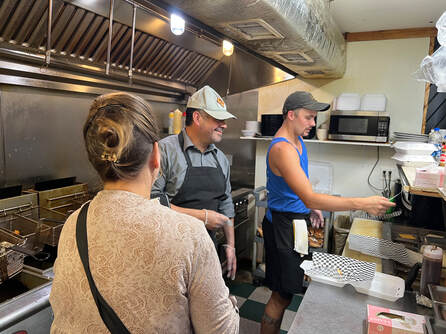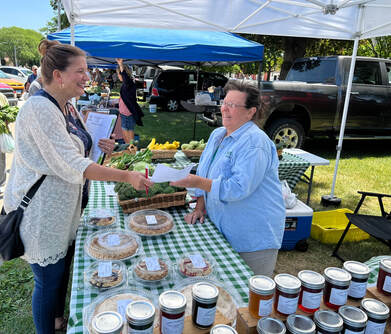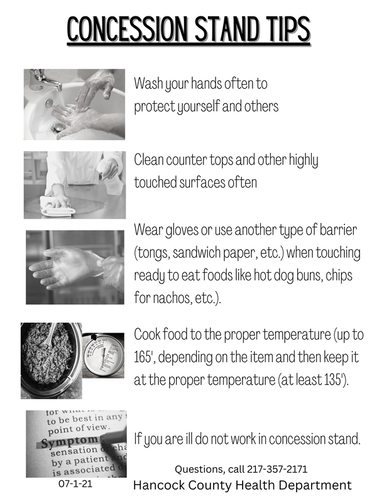IF YOU WOULD LIKE TO START A FOOD BUSINESS
PLEASE CONTACT OUR OFFICE TO FIND OUT
WHAT DIRECTION WOULD BE THE MOST APPROPRIATE
THERE ARE MANY OPTIONS!
EACH HAVE CERTAIN GUIDELINES THAT MUST BE FOLLOWED
PLEASE CONTACT OUR OFFICE TO FIND OUT
WHAT DIRECTION WOULD BE THE MOST APPROPRIATE
THERE ARE MANY OPTIONS!
EACH HAVE CERTAIN GUIDELINES THAT MUST BE FOLLOWED
Licensed and inspected food, establishments/operations
According to the Hancock County food ordinance, all food establishments/operations must complete an application for food service and pay the required permit fee on an annual basis. Failure to do so will result in closure of food establishment/unit until the matter is taken care of.
According to the Hancock County food ordinance, all food establishments/operations must complete an application for food service and pay the required permit fee on an annual basis. Failure to do so will result in closure of food establishment/unit until the matter is taken care of.
| 2024_application_for_food_service_permit.docx | |
| File Size: | 74 kb |
| File Type: | docx |
| 2024_non_profit_application_for_food_service_permit.docx | |
| File Size: | 95 kb |
| File Type: | docx |
Temporary Food Service event
Organizations and/or individuals can have up to 10 temporary events, lasting no more than 14 days each. An application for temporary food service must be completed and submitted prior to the event. Educational information on the prevention of foodborne Illness is provided to the organization/ individual.
The menu for a temporary event should include food that is made at the location the food operation is set up. No food can be made at a persons residence and then brought to the temporary event to be sold. The only exception is desserts like cake, fruit pies, brownies and cookies can be made at home and sold at temporary events. No temperature-regulated deserts like, meringue, pumpkin, or custard pies, or cheesecakes are allowed.
Organizations and/or individuals can have up to 10 temporary events, lasting no more than 14 days each. An application for temporary food service must be completed and submitted prior to the event. Educational information on the prevention of foodborne Illness is provided to the organization/ individual.
The menu for a temporary event should include food that is made at the location the food operation is set up. No food can be made at a persons residence and then brought to the temporary event to be sold. The only exception is desserts like cake, fruit pies, brownies and cookies can be made at home and sold at temporary events. No temperature-regulated deserts like, meringue, pumpkin, or custard pies, or cheesecakes are allowed.
| 2024application_for_temporary_food_service_permit.docx | |
| File Size: | 58 kb |
| File Type: | docx |
| Handwashing at a Temporary Event | |
| File Size: | 263 kb |
| File Type: | |
New, existing or remodeled food operations (including mobile units )
Contact the food program as soon as possible to ensure that the state plumbing code, and the FDA food code requirements are followed during the creation or remodeling of the food operation. There are many steps to the process that have to be met in order to open. Not following the required guidelines and process may result in a delay in opening and additional expenses may be incurred because the requirements were not initially followed. It is best to first contact the Hancock County Health Department at 217-357-2171 option 4 to get started.
Our friendly staff will guide you and provide you with information to get your operation up and going!
| Requirements for Food Establishments | |
| File Size: | 44 kb |
| File Type: | docx |
| Plan Review Checklist | |
| File Size: | 52 kb |
| File Type: | docx |
| Steps in Opening a Food Service Entity or Establishment | |
| File Size: | 17 kb |
| File Type: | docx |
Food Service Inspections
All licensed and inspection food service operations in Hancock County are inspected. Inspection frequency is dependent on the class in which the establishment is categorized. Food establishments undergo an annual risk assessment to determine which category best fits the establishment. During an inspection many aspects of food safety are assessed, for example, temperatures and storage of food, employee practices and training, and cleanliness of operation.
All licensed and inspection food service operations in Hancock County are inspected. Inspection frequency is dependent on the class in which the establishment is categorized. Food establishments undergo an annual risk assessment to determine which category best fits the establishment. During an inspection many aspects of food safety are assessed, for example, temperatures and storage of food, employee practices and training, and cleanliness of operation.
Bake Sales
Bake sales are great fundraisers and can be a very enjoyable event for an organization raising money. With that being said, there are a few guidelines to follow in order to prevent foodborne illness. SEE ATTACHMENT BELOW
Bake sales are great fundraisers and can be a very enjoyable event for an organization raising money. With that being said, there are a few guidelines to follow in order to prevent foodborne illness. SEE ATTACHMENT BELOW
| Bake Sale | |
| File Size: | 159 kb |
| File Type: | |
Cottage food operations
Many changes have taken place over the past several years to make it easier for entrepreneurs to produce certain foods in their home kitchen and sell them not only at farmers markets, but, fairs, festivals, vendor shows, online, public events, as well as, deliver to customers, and even ship their products within Illinois. This classification requires the operation to have anyone preparing or packaging food to receive a Food Service Protection Managers Certification, meet labeling requirements, not produce any foods on the unacceptable food list and follow instructions for foods that can be produced but require special processes. All Cottage Food Operations are required to complete the Cottage Food Application and submit it along with the other required paperwork to the Hancock County Health Department prior to selling their products.
https://extension.illinois.edu/cottage-food
Many changes have taken place over the past several years to make it easier for entrepreneurs to produce certain foods in their home kitchen and sell them not only at farmers markets, but, fairs, festivals, vendor shows, online, public events, as well as, deliver to customers, and even ship their products within Illinois. This classification requires the operation to have anyone preparing or packaging food to receive a Food Service Protection Managers Certification, meet labeling requirements, not produce any foods on the unacceptable food list and follow instructions for foods that can be produced but require special processes. All Cottage Food Operations are required to complete the Cottage Food Application and submit it along with the other required paperwork to the Hancock County Health Department prior to selling their products.
https://extension.illinois.edu/cottage-food
| cottage_food_registration_2024.docx | |
| File Size: | 68 kb |
| File Type: | docx |
| Cottage Food Guide | |
| File Size: | 1655 kb |
| File Type: | |
Farmers market
Farmers Market vendors can enjoy selling their home grown produce at local farmers market locations. Customers can reap the benefits of buying fresh, local tomatoes, green beans, beets, sweet corn, strawberries, apples, pumpkins and so much more! Farmers market vendors are required to complete an application and submit it to the Hancock County Health Department.
Farmers Market vendors can enjoy selling their home grown produce at local farmers market locations. Customers can reap the benefits of buying fresh, local tomatoes, green beans, beets, sweet corn, strawberries, apples, pumpkins and so much more! Farmers market vendors are required to complete an application and submit it to the Hancock County Health Department.
| 2024_farmers_market_application.docx | |
| File Size: | 39 kb |
| File Type: | docx |
Concession Stand
The Hancock County Health Department does not currently regulate concession stands at sporting events. With that being said it is our hope that those serving at a concession stand take proper measures to protect customers from foodborne illness. Proper handwashing, food handling, cleaning, storing, proper cooking and holding temperatures should always be a priority in order to protect the spectators.
The Hancock County Health Department does not currently regulate concession stands at sporting events. With that being said it is our hope that those serving at a concession stand take proper measures to protect customers from foodborne illness. Proper handwashing, food handling, cleaning, storing, proper cooking and holding temperatures should always be a priority in order to protect the spectators.
In accordance with federal civil rights law and U.S. Department of Agriculture (USDA) civil rights regulations and policies, this
institution is prohibited from discriminating on the basis of race, color, national origin, sex (including gender identity
and sexual orientation), disability, age, or reprisal or retaliation for prior civil rights activity.
Program information may be made available in languages other than English.
Persons with disabilities who require alternative means of communication to obtain program information (e.g., Braille,
large print, audiotape, American Sign Language), should contact the responsible state or local agency
that administers the program or USDA’s TARGET Center at (202) 720-2600 (voice and TTY)
or contact USDA through the Federal Relay Service at (800) 877-8339.
To file a program discrimination complaint, a Complainant should complete a Form AD3027, USDA Program Discrimination Complaint
Form which can be obtained online at: https://www.usda.gov/sites/default/files/documents/USDA-OASCR%20P-ComplaintForm-0508-0002-508-11-28-17Fax2Mail.pdf, from any USDA office, by calling (866) 632-9992, or by writing a letter addressed to USDA.
The letter must contain the complainant’s name, address, telephone number, and a written description of the alleged
discriminatory action in sufficient detail to inform the Assistant Secretary for Civil Rights (ASCR) about the nature
and date of an alleged civil rights violation. The completed AD-3027 form or letter must be submitted to USDA by: 1. mail: U.S.
Department of Agriculture Office of the Assistant Secretary for Civil Rights 1400 Independence Avenue, SW Washington, D.C.
20250-9410; or 2. fax: (833) 256-1665 or (202) 690-7442; or 3. email: [email protected].
This institution is an equal opportunity provider.
Updated 5/5/2022
institution is prohibited from discriminating on the basis of race, color, national origin, sex (including gender identity
and sexual orientation), disability, age, or reprisal or retaliation for prior civil rights activity.
Program information may be made available in languages other than English.
Persons with disabilities who require alternative means of communication to obtain program information (e.g., Braille,
large print, audiotape, American Sign Language), should contact the responsible state or local agency
that administers the program or USDA’s TARGET Center at (202) 720-2600 (voice and TTY)
or contact USDA through the Federal Relay Service at (800) 877-8339.
To file a program discrimination complaint, a Complainant should complete a Form AD3027, USDA Program Discrimination Complaint
Form which can be obtained online at: https://www.usda.gov/sites/default/files/documents/USDA-OASCR%20P-ComplaintForm-0508-0002-508-11-28-17Fax2Mail.pdf, from any USDA office, by calling (866) 632-9992, or by writing a letter addressed to USDA.
The letter must contain the complainant’s name, address, telephone number, and a written description of the alleged
discriminatory action in sufficient detail to inform the Assistant Secretary for Civil Rights (ASCR) about the nature
and date of an alleged civil rights violation. The completed AD-3027 form or letter must be submitted to USDA by: 1. mail: U.S.
Department of Agriculture Office of the Assistant Secretary for Civil Rights 1400 Independence Avenue, SW Washington, D.C.
20250-9410; or 2. fax: (833) 256-1665 or (202) 690-7442; or 3. email: [email protected].
This institution is an equal opportunity provider.
Updated 5/5/2022


